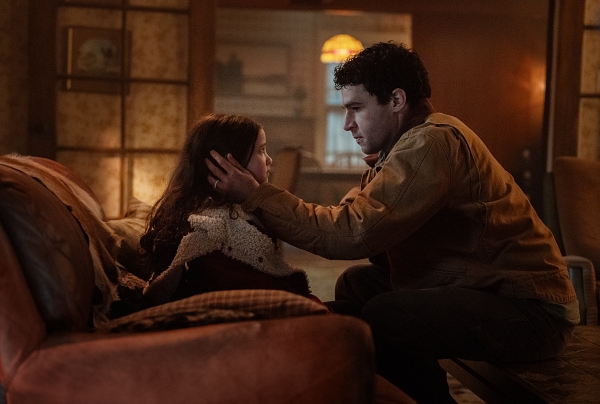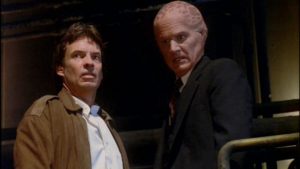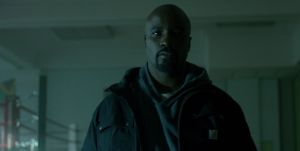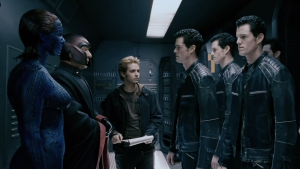
The Wolf Man has a shaggy history in the annals of cinema. After premiering in George Waggner’s well-regarded 1941 feature, the character went on to appear in increasingly desperate mashups alongside Frankenstein, Dracula, Abbott and Costello, and—for some godforsaken reason—Alvin and the Chipmunks. Joe Johnson’s 2010 dreadfully dull remake with Benicio del Toro and Anthony Hopkins was widely panned. Years later, Ryan Gosling was briefly set to play the character in the quickly-sundowned Dark Universe series. Like a full moon waning, the monster movie icon was put to rest. Following a successful stint reviving the Universal monster movies with the critically acclaimed, box-office hit The Invisible Man, writer-director Leigh Whannell (Saw, Upgrade) was tapped to try his hand at this oft-cursed property, recruiting Christopher Abbott as his leading lupine man to star opposite Ozark’s Julia Garner.
While the pairing of storyteller and story isn’t quite as mesmerizing as that 2020 surprise hit, Whannell proves once again that his flair for dramatically thoughtful and genuinely scary horror is a perfect match for Universal’s classic monster movies. Wolf Man is a wholly sturdy new vision of this age-old story—a tragedy with teeth and plenty of hair-raising scares. Working from a screenplay he co-wrote with actress-turned-scriptwriter Corbett Tuck, Whannell frames the story of the wolf man through the lens of an average family who just happen to be trying to reconnect in the wrong part of the Central Oregon backwoods. Bad things happen.
After learning the state of Oregon has officially pronounced his long-missing father deceased, Blake (Abbott) wants to patch things up with his wife Charlotte (Garner). They’re not estranged so much as on edge: snappy with one another, consumed by the minutiae of their lives and work. The spark is gone, though love remains. Blake proposes that they escape the city with their daughter Ginger (Matilda Firth) and travel as a family to where he grew up under the watchful eye of a militant father to pack up his now-dead dad’s things. Within moments of arriving in this far-flung corner of PNW middle of nowhere, their kumbaya plans to reconnect as a family go literally off the rails. Following a brutal crash, they find themselves relentlessly pursued by a blood-thirsty bipedal, wolf-like cryptid. To make matters worse, Blake seems to be infected by a scratch from the beast, his faculties rapidly succumbing to some dark and twisted fate.
Abbott shines in the lead role, skillfully balancing the protective instincts of a loving father with the primal rage of a man going rabid. His chemistry with Firth adds emotional heft to the film, particularly in the quieter moments when his humanity starts slipping beneath the pall of some other monstrous pull, the impressive makeup and prosthetics never completely overshadowing the man underneath them. Garner proves a capable, channeling the horrifying angst of someone forced to watch their beloved undone in real time. Whannell frames these scenes in a somewhat untraditional way: they feel more inspired by visiting a loved one in hospice than your standard Blumhouse fare. Charlotte’s arc isn’t without its flaws though, a subplot involving her being the less preferred parent never quite lands— it’s more of a thematic loose end that, while not essential, could have added another layer to this doomed family dynamic and the story’s dramatic heft.
As a director, Whannell fully embraces a Spielbergian ability to put viewers on edge—aping not one but two iconic Jurassic Park set pieces—while injecting Wolf Man with an impressive amount of truly stressful set pieces. But the real cortisol-spiking moments are mined with the simple mechanics of silence and darkness. The creaky soundscape elevates the terror of the unknown, transfixing willing audiences into a pallor of silence. Whannell’s crafty use of perspective—shifting in and out of human and wolf POV—creates an interesting cinematic framework for exploring body horror, placing the audience in a first-person perspective and forcing them to undergo the Kafkaesque metamorphosis alongside the characters. Special effects play a pivotal role here: dizzying, grotesque, and tragic, emphasizing the emotional devastation that comes with body horror and unwilling transformation.
Much of what makes Wolf Man effective is its economy. The story revolves primarily around the family trio, with only a handful of minor characters appearing along the outskirts. This tight focus works in the film’s favor, creating an intimacy that amplifies the tension and the tragedy. As Blake shares with Charlotte after his father’s death, “I realized that you’re all the family I have left.” But like a rabid dog, friend and foe become indiscernible under the confusing spell of instinctual violence. Whannell roots much of the emerging terror in this family’s isolation, underscoring how small their world becomes—trapped in the woods, far from their city life—as they are stalked by a beast that once sought only to protect them. This theme of inverted instinct is mirrored in Blake’s transformation, where his primal instincts threaten to consume the connections he’s dying to preserve.
Wolf Man suffers from being a little too tidy, its narrative edges smoothed to a fault, and its mythology only faintly sketched. While there are nods to deeper lore—such as an introductory title card invoking an obligatory Native American legend—the film never fully commits to weaving these elements into its DNA. The result is a climax that feels restrained when it could have been explosive, leaving a lingering sense that Wolf Man is content to stop just shy of greatness. The ending, while thematically consistent with the film’s balance of heart and horror, resolves too neatly, missing the kind of raw emotional devastation that might have elevated it into a modern classic.
Nevertheless, Whannell’s craftsmanship and clear affection for the material shine through, making Wolf Man a thoroughly satisfying thrill ride that doesn’t shortchange its own internal logic or well-established melodrama. It’s a chilling fable about being unable to protect your family from the forces of the world — from both external threats and the internal forces that pull us apart. And, like a derelict pickup truck, while it may not quite shift into the next gear, it’s a worthy, thoughtful addition to Universal’s monster movie canon and a compelling argument that the wolf man still has plenty of bite.
CONCLUSION: Leigh Whannell proves he is the modern maestro of Universal Monster Movies with ‘Wolf Man’, a slow-burn creature feature about the horrors of losing oneself while surrounded by those you love – and then trying to slaughter them. Reinforced my deep-seated desire to never get rabies.
B
For other reviews, interviews, and featured articles, be sure to:
Follow Silver Screen Riot on Facebook
Follow Silver Screen Riot on Twitter
The post ‘WOLF MAN’ Redux Howls With Heart and Horror appeared first on Silver Screen Riot.








